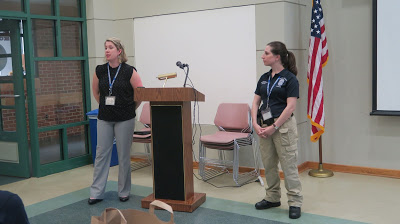Police unit aids crime victims
 |
| Victim services specialist Kristen Sanders (left) and Det. Amanda Paris speak at a community meeting at the Mason Government Center. |
Victims of domestic violence, assault, and other crimes are entitled to assistance from the Victim Services Unit (VSU), an office within the Fairfax County Police Department staffed by civilians.
Kristen Sanders, a member of the VSU based at the Mason Police Station, and Det. Amanda Paris, a domestic violence specialist, described their roles at the June 5 meeting the Mason Police District’s Citizen Advisory Committee.
The VSU helped 3,300 victims across the county in 2017. The Mason Police District had the second highest number, following Mount Vernon.
Fairfax County guarantees victims and witness “are treated with respect and dignity and afforded rights and services designed to address the specifics of their victimization,” Sanders said. A victim is “anyone emotionally, physically, and/or financially affected by a crime.”
Victim services specialists are on call 24/7 and serve as liaisons with police officers, detectives, and the commonwealth attorney. They accompany officers to crime scenes to help with crisis intervention.
Sanders and her colleagues at other police stations make home visits and calls to victims of crime, prepare victims for court proceedings and drive them to court if necessary, take them to the hospital for exams if they’ve been physically harmed, help them get a protective order from a judge, secure emergency shelter for them, and provide financial resources for them from a victims’ fund. Those funds can be used for hospital bills for assault victims and burial costs for homicide victims.
Sometimes just sitting with a victim is helpful even if they don’t way to talk, she says.
Sanders aids victims of all sorts of crimes, including domestic violence, sex crimes against children or adults, robbery, assault, stalking, and DUI manslaughter.
Helping victims in the diverse Annandale/Mason District area is bit more challenging, Sanders says. Sometimes people from other countries don’t understand their rights and don’t speak English. She often has to use the “language line” to provide translations.
Sanders works closely with Paris, who is also stationed at the Mason Police District and focuses on child abuse, stalking, and harassment cases, as well as domestic violence.
Paris conducts Lethality Assessment Program (LAP) screenings for victims to determine whether their attacker is at risk of committing homicide or serious injury. The LAP consists of a series of questions, such as “Did he try to choke you?” “Does he have a gun?” and “Has he threatened you?”
She described the process they go through in a typical case of felony strangulation in a domestic relationship: The victim tries to dial 911 but the offender grabs the phone away. Paris takes the victim to the hospital where she is examined to make sure there are no internal injuries while photos and measurements are taken of the marks on her neck. That report is later used against the offender in court.
The offender is arrested and charged with assault, strangulation, and preventing a 911 call. Sanders and Paris meet with the victim and offer resources, such as emergency shelter and financial assistance, and help her obtain an emergency protective order.
Paris presents the case to the commonwealth attorney, conducts an investigation, and makes sure the victims understands the process in court.
Sanders help the victim find a safe place to live and makes sure the schools have copies of the protective order so the offender can’t pick up the children.
Providing financial resources is critical, Sanders says, because some victims are worried about losing their income if their partner is charged with a crime. Sanders avoids being a witness in court, because that would jeopardize her role as victim’s advocate.
Many victims also don’t want to press charges, because they don’t want the offender to go jail. If police are called and determine a crime has been committed, they have to make an arrest, regardless of what the victim wants, Paris said.
Some victims in Mason District don’t report incidents to the police because they fear they could be deported, Sanders added. “Even reassuring them is difficult.” Victims of crimes who are willing to assist law enforcement can apply for a U visa, allowing them to stay in the U.S.
If people are being stalked, Sanders urges them to document incidents and seek a protective order, which can prohibit a stalker from getting within a certain distance.
At the end of the meeting, the presenters encouraged people who are being abused or know someone who is a victim of domestic violence or other crime to contact them. Det. Amanda Paris can be reached at 703-277-2305. Victim services specialist Kristen Sanders can be reached at 703-277-2242.

